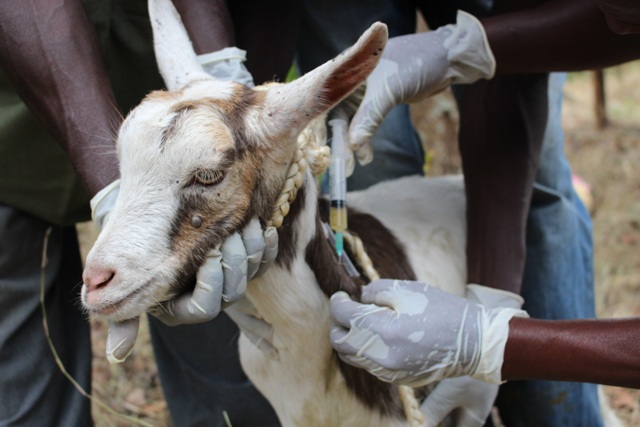

A big part of animal care is disease mitigation and prevention. Regardless of the type of animal you own, be it a cat, dog, horse, or goat, illness and disease are issues with which you may be faced. The best case scenario is to prevent this from occurring in the first place. Creating a regular vaccination routine is useful when it comes to establishing and maintaining continued good health amongst your goat herd.
The purpose of a vaccine is to boost each goat’s ability to fight off disease, therefore improving their overall health for the long haul. Goats that are current on vaccinations will be better protected against the variety of diseases that could affect them. Though this is important for all goats, it is especially important for goats that travel, such as to shows, or herds that experience a frequent influx of new goats.
Before bringing a new goat home, it is ideal all applicable vaccinations have already been given to that animal. However, it doesn’t stop there. Kids will have to be vaccinated and necessary vaccines will need to be administered at proper intervals to keep immunity current. Since there are several diseases which could impact your goats, it is important to know what they are and how to properly vaccinate. Some examples of goat disease are:
Enterotoxemia is a widely seen goat disease that occurs when bacteria normally present begin to rapidly reproduce in the intestinal tract until lethal levels of toxins are present. This then slows down the digestive process and causes stomach pain and possibly even death of goats, but an annual vaccination can prevent this from becoming a problem. The vaccine for this is called CDT and also includes Tetanus.
Tetanus is a very important vaccine to administer to goats simply because of the many possible sources of it. Clostridium tetani can be found in soil and affects goats typically through a wound, be it from play, castration, or even giving birth. Once it makes its way into the wound where oxygen is not able to reach it, neurotoxins are released that can be fatal. After wound exposure has occurred and toxins are deep in the body, odds of survival decrease dramatically. That is why annual tetanus vaccines are so important, although kids will require a booster after their initial vaccination.
Rabies is something no one wants to see in an animal of any species. It is transmitted via bite from an infected animal and can be fatal. Although some areas haven’t seen cases of rabies in quite some time, not vaccinating for it is a bit of a roll of the dice. It is often better to be safe than sorry and vaccinate annually as recovery from rabies may not be possible.
Pneumonia tends to strike in spring and summer and can cause death if prompt medical attention is not rendered. A better option is an annual vaccine to prevent it from occurring in the first place. The initial vaccine should be given between four and six months of age with a booster to follow a couple of weeks later to establish immunity.
Though these are some very important goat vaccines, the need for vaccines does not end there. Other potential goat diseases (Chlamydia abortion, Cornybacterium pseudotuberculosis, Orf, etc.) are still threats to goat health and also need to be on your list. If you have any questions or concerns, consulting with your vet for vaccine schedules and recommendations is a good place to start. Something else to consider and possibly discuss with your vet is vaccines that are not necessarily marketed for goats but can be used for goats. Some vaccines can be used for different species, but not all of them, so take the time to verify this beforehand as using the wrong animal vaccine can pose problems for goats.
Vaccinating goats properly and in a timely manner will give them the best chance of a long, healthy life. At the same time, it gives you peace of mind to know they are as protected as they can possibly get when it comes to illness and disease. Each time you administer a vaccine, be sure to make a record of it so the process of annual vaccinations will be as streamlined and hassle-free as possible for both you and the goats in your life.
 Contact Jaguza Support
Contact Jaguza Support